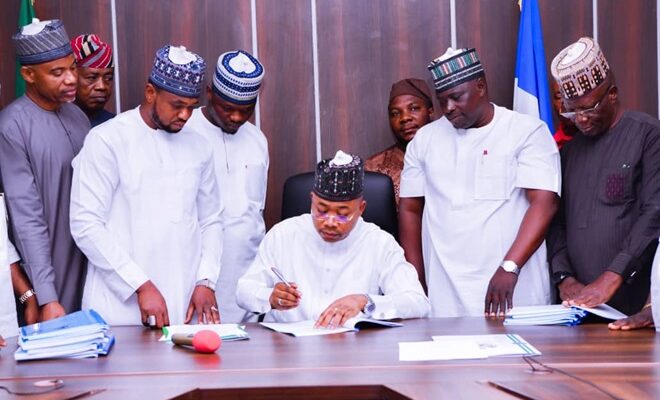Kogi State Governor, Alhaji Ahmed Usman Ododo on Thursday signed seven bills into law with a charge to the people of the state to embrace the new laws in order to move Kogi state forward.
In his remarks shortly after signing the bills into law, Governor Ododo commended the State House of Assembly for their patriotism and dedication, referring to Bills as “People oriented bills”.
According to the Governor, the newly signed Anti Corruption Agency Law will strengthen the capacity of the state to prevent corruption as well as investigate and prosecute corruption cases.
“We have given legal teeth to the agency to be able to bite corruption. This is a clear statement by my administration that we will attack corrupt practices and make it impossible for corruption to thrive.
“All lovers of development will frown at corruption. We won’t allow corrupt practices. I will give all necessary support to the agency to perform its duties judiciously”, he said.
Ododo thanked President Bola Ahmed Tinubu for making it possible for states to generate, transmit and distribute electricity, saying this will help to finally resolve the power challenge in the nation.
“Mr President has finally discovered the path to permanently resolve the power crisis in Nigeria. Opening up the industry will widen the operational field and deliver more megawatts to the national grid.
“As a State, we are taking full advantage of this opening made possible by the bold policies of Mr President and I can assure you that Kogi is ready to play on the big State as far as the issue of power is concerned”.
The Governor said the Kogi State Scholarship Law is aimed at helping indigent students attain their dreams, saying his administration will continue to prioritize education.
“We have continued to prioritize education because we are convinced that education is the bulwark of development. As a student, I knew what I went through to be educated. Being on this seat has offered me the opportunity to support our students to excel in their educational career.
“I also use this opportunity to congratulate Nigerians on the Students Loan Scheme of Mr. President. We have a smart President who is determined to protect the poor and the weak. With him, it is obvious that our nation shall prosper”.
The seven new laws include:
A Law to repeal and Re-enact the Kogi State Local Government Service Commission Law 2014 and fother matters connected therewith, 2024;
A Law to repeal and Re-enact the Kogi State Scholarship Board Edict, 1998 and other matters connected therewith, 2024;
A Law to establish the Kogi State Electricity Market and the Kogi State Electricity Regulatory Commission to Regulate Electricity Generation, Transmission, System Operation Distribution, Supply and Promote Access to Electricity in the State through increased Private Sector Investments or Public Private Partnership in Grid, Multi-Grid and other Off-grid Electricity Option using Renewable and Non-renewable Fuel Sources in the State and other Purposes Connected Therewith, 2024;
A Law to Establish the Kogi State Anti Corruption Agency and other matters connected therewith, 2024;
The Kogi State Commodity Exchange, Export Promotion and Market Development Agency Law, 2024;
The Kogi State Information Technology Development Agency Law, 2024;
The law to repeal and re-enact the Kogi State Mineral Resources Development Agency Law, 2015 and other matters connected there with, 2024.
Earlier, the Speaker of the Kogi State House of Assembly, Rt. Hon Aliyu Umar Yusuf said the Assembly did a thorough job and even consulted experts to ensure that when passed, the laws can stand the test of time.
He said the State House of Assembly is committed to ensuring purposeful legislation for the development of the State.
Reacting to the development, Executive Director of Conscience for Human Rights and Conflict Resolution (CHRCR) Lokoja, Comrade Idris Miliki Abdul, said the anti-corruption law is a commendable step.
Miliki, however, called that necessary framework and machinery be put in place for proper implementation.
The ceremony was attended by members of the State House of Assembly and other top Government officials.





